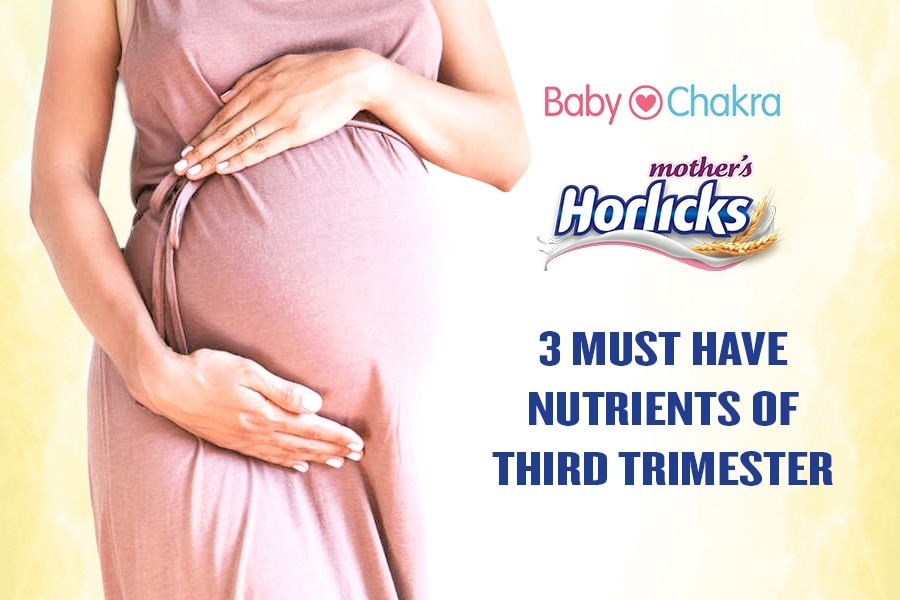
Do Not Miss These Nutrients in Your Diet
8 Nov 2019 | 4 min Read
vani
Author | 82 Articles
A pregnancy lasts for about 40 weeks. The baby is considered full term at the end of week 37 and it’s only a matter of time before the baby will be born.
By the end of the second trimester, mom-to-be starts looking and feeling more pregnant. However aches and pains are some of the glitches of this trimester. Third trimester witnesses a major spurt in growth and development of baby in terms of organ development and physical appearance.
The third trimester can be both physically and emotionally challenging for a pregnant woman. In the third trimester, the baby’s bones are fully formed. The baby can now open and close its eyes and sense light. The baby’s body begins to store minerals like iron and calcium. While it is important for mom-to-be to continue eating healthy, it is essential to focus on certain key nutrients that play a vital role in baby’s growth and preparing her body for delivery and postpartum.
While the Mom-to-be continues to take her prenatal supplements to suffice her nutritional needs like Choline, Folic Acid and Vitamins, adding a glass of Mother’s Horlicks with 25 vital nutrients to her diet is another great way to supplement her increasing nutritional requirements in third trimester.
Every nutrient that a Mom-to-be consumes through her diet has a vital role to play in her health and baby’s development.Here is your GO TO CHECKLIST of top 3 nutrients that you must include in your diet during third trimester of pregnancy:
Omega 3 -DHA
DHA is particularly important for fetal development of the brain and retina during the third trimester and up to 18 months of life. A diet rich in Omega 3 has positive effects on a child’s sensory, cognitive, and motor development. Taking DHA consistently through diet and supplements in pregnancy reduces risks of preterm delivery and postpartum depression. It is also known to reduce risks of preeclampsia and increased birth weight.

Iron
By the third trimester, there is an increase of blood supply to the baby and placenta in the womb. This means that the mom-to-be needs to increase her Iron content, since Iron plays a vital role in making that extra blood. It also helps to move oxygen from the lungs to the baby. Lack of Iron can lead to anemia, which in turn can lead to a low weight baby.

Protein
The baby grows most rapidly during the third trimester; hence the protein levels during the latter stage of pregnancy are vital.Protein is made up of amino acids that build baby’s adorable face and every cell below it. In third trimester, the baby’s brain, in particular, needs proteins to transform itself into the wondrous organ that will help baby breathe, walk and talk.
A pregnancy lasts for about 40 weeks. The baby is considered full term at the end of week 37 and it’s only a matter of time before the baby will be born.

Apart from the above three major nutrients, there are many other vital nutrients that should not be neglected in third trimester, as part of every day diet during third trimester.

Third trimester marks the last phase of pregnancy, the end of which makes a shift to the new role called ”Mother”. It is essential for a pregnant woman to prepare herself for this role by taking the best care of herself and her baby in these nine months. Taking the best care and nutrition during pregnancy ensures a healthy baby and happy motherhood.
Disclaimer: It is important to consult with your Doctor before deciding the dose and content of nutrition before consumption.
The views, opinions and recommendations expressed in this article are solely those of the author and intended as an educational aid
A


Related Topics for you
Suggestions offered by doctors on BabyChakra are of advisory nature i.e., for educational and informational purposes only. Content posted on, created for, or compiled by BabyChakra is not intended or designed to replace your doctor's independent judgment about any symptom, condition, or the appropriateness or risks of a procedure or treatment for a given person.
